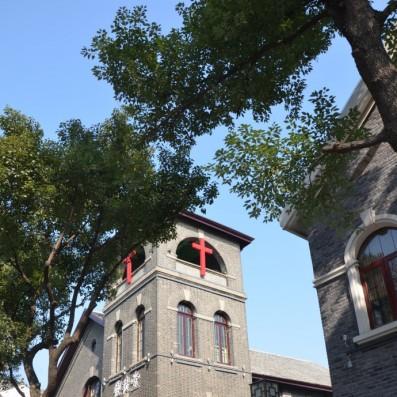"Although my teacher passed away, I feel he is still alive… My great teacher was so knowledgeable about the ancient and modern times... While the Sino-US relationship was improving and becoming deeper, my teacher acted as a bridge between the two." Those were the words of the inscriptions written by Zhang Zuling, a Confucian scholar of Kunshan Mountain, in memory of DuBose, a missionary to China in the late 19th century. The inscriptions were engraved on a monument by craftsmen.
During his 38 years in Suzhou, China, Hampden Coit Dubose did many great things. He preached the gospel, established churches, ran schools, published Bible commentaries, and founded the Anti-Opium League in China. He tremendously influenced public opinion against the opium trade.
Hampden Coit DuBose was born on 30 September 1845 in South Carolina. Later he graduated from Columbia Theological Seminary. In 1872, he was assigned by the American Presbyterian Church to Suzhou where he took his newly wedded wife with him.
They rented a house in Suzhou Lane and started a gospel ministry. In the region, they built a long-term relationship with the local people and learned the Suzhou dialect. They visited the local Confucian scholars and left their footprints in Yangjiaqiao, Yokota, Guangfu, and other rural areas where they preached. Historical resources suggest that the DuBose team established a total of 14 churches in Suzhou City distributed across eight towns in the Shushuguan and Lumu regions.
DuBose was also keen on education. In early 1872, he set up a school in Fengmen. Later, he built more schools in Panmen, the twin tower temple, and Zhangjia Alley.
He also contributed to resources for the study of the Bible. In 1892, he was appointed by the Christian Bible Commentary Committee as a Bible commentator.
In 1909, his Commentary of Proverbs was published at Shanghai Sino-US Book House and The Commentary of Judges in lead-print at the Chinese Christianity Publisher. DuBose’s translation of the Bible can be found among his sermons he wrote in Chinese.
In addition, he paid attention to the relationship between the Christian faith and Chinese culture. His works in this area included Preaching in Sinim: The Gospel to the Gentiles, with Hints and Helps for Addressing a Heathen Audience, The Image, the Dragon, and the Demon: Or the Three Religions of China Confucianism, Buddhism and Taoism and Preaching in the Pulpit (in Chinese).
Among all his brilliant contributions, he perhaps was best known for his active participation in the anti-opium campaign. The City of Suzhou, located along the Beijing-Hangzhou Canal, was entitled ‘heaven on earth’, a city full of natural and artistic beauty. However, he witnessed the disaster caused by opium. Although it had been more than 30 years since General Lin Zexu campaigned to ban opium and the Opium War had become history by then, opium was still there leaving a very bad aftermath.
Seeing the scourge of opium and the problems it caused for people, he and the prominent missionary William Hector Park along with Christian medical professionals decided to establish the Anti-Opium League in China. DuBose became its first president. This was the first anti-opium society in China.
Their anti-opium campaign gained momentum, and many people joined in after learning about the organization. In 1899, the Anti-Opium League published “Opinions of over 100 Physicians on the Use of Opium in China”, a survey report that involved more than 100 professionals in medicine, explaining the purpose of the organization, and the dangers of opium. Ultimately it gained the advocacy of public opinion on banning the trade.
During the campaign, DuBose wrote in 1895 to the British and American governments pleading for an end to the sale of opium to China, and he organized missionaries to sign a joint petition pleading for the Qin government to ban opium.
The organization was supported by the then U.S. President Theodore Roosevelt, the U.S. Congress, the All-Nations Anti-Opium Association, and the British Parliament.
DuBose also wrote a petition signed by more than 1,000 missionaries to the Chinese Emperor. Later, the Emperor issued an official document banning the trade and use of opium. The document was based exactly on the petition drafted by DuBose and others.
To this day, the Monument to Mr. DuBose erected by Christians in 1910 is still standing in the Apostle Church (formerly DuBose Memorial Church). Part of the inscriptions on it is a record of his campaign to ban opium, which reads:
"My teacher had the heart of God as his heart so that he could sincerely conduct his ministry to save the world that men found difficult to accomplish. Grieved by the harm that opium brought to the East and its opposition to the holy teachings of the Christian faith, he knew the people could regain life when addiction was dealt with.
The evidence of trade came from India to China... The Governor of the Jin-Yu two rivers was awakened to the harm by a petition signed by more than 1300 Western missionaries in China, which proposed a detailed strategy to ban opium trade. The petition was commissioned and sent to the External Affairs Ministry to deliver to the loyal court. The proposal was granted by the Emperor. Today the gradual elimination of the opium scourge in China would not have been possible had it not been for my teacher’s passion and his hard work to save China."
DuBose died in Suzhou in 1910 at the age of 65, but the mission continued, and Mrs. DuBose took her son, Palmer Clisby DuBose to China to continue the mission. In 1920, they also refurbished a church, which was completed in 1925 and named it the DuBose Memorial Church in honor of the Rev. DuBose.
In 1951, the church’s name was changed to the Apostle Church. It is now located at the junction of Gangjiang Road and Yangyu Lane. The church faces the west and its bell tower can be seen from afar.
- Translated by Charlie Li












